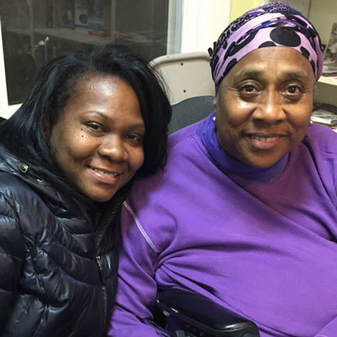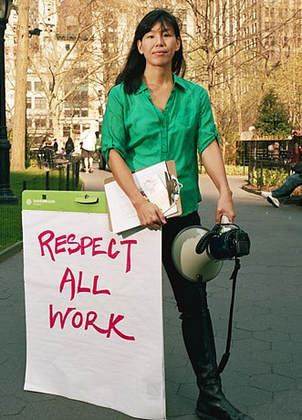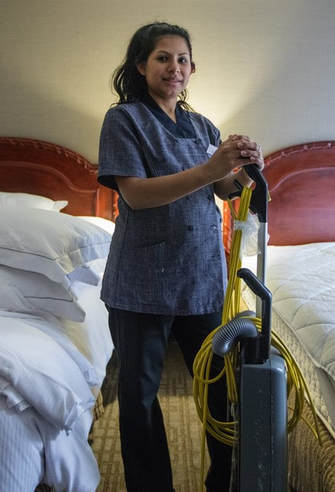|
You will hear arguments that labor unions are obsolete. Twenty-eight states have passed anti-union legislation.
Take one minute and watch the video below. Let Nancy inspire you!  Photo courtesy of Caring Across Generations Photo courtesy of Caring Across Generations More than sixty-five million people in America work day in and day out as family caregivers, nannies, housekeepers and home healthcare workers—that's more than the populations of California and Texas combined. Yet, they are mostly invisible except to the families they serve. They work with many of our most vulnerable people, the elderly, the disabled, the very young. No surprise, our economy does not value this and they have few legal protections. Many tolerate low, or no pay and abusive employers. D’Rosa Davis is a member of the Atlanta Chapter of the National Domestic Workers Alliance, which lobbies for workers rights and fair compensation. She told Caring Acros Generations, “I earn $9 an hour....I work 70 hours one week, and then around 45 the next week...Like any mom I wish I didn’t haven’t to work so much — but when at $9 an hour what choice do I have? Earning so little means I can’t do much with my kids — and that breaks my heart." Traditional labor union bargaining over wages and hours doesn't work between families and caregivers, inspiring young activists like Ai-jen Poo to be creative. (I told you about her here....)  Photo Courtesy Time Magazine Photo Courtesy Time Magazine Ai-Jen Poo (left) works to bring together a broad spectrum of stakeholders in the community to work together to improve the lives of workers and change the way we as a culture perceive labor. She told me, "As inequality continues to rise & technology transforms jobs, we must reaffirm the value & centrality of work, and build a movement that allows workers to be a part of shaping the future of work." Again, not surprising, it's mostly women's work she's talking about. Ninety percent of home health aides and 95% of domestic workers are women. Women are 47% of our country's workforce, and nearly half of them contribute an equal share to the family budget or are the primary breadwinners in the family. Ninety percent of working women do not belong to unions.  Another group of hard working, women who often live in poverty are restaurant servers. According to Restaurant Opportunities Center United (ROC) 70% of the people waiting tables are women, and they suffer “the worst sexual harassment of any industry in the United States.” Aisha Thurman, told ROC, male customers “think, you know, my body is for them to enjoy, to look at, touch, say what they want. They think if they throw me a couple dollars in the form of a tip, it’s OK.”  Immigrants who fear deportation if they complain of abuse and women of color have it the worst. A recent report by the Institute of Policy Research, found that while black women vote at high rates, are increasingly earning college degrees and succeeding in owning their own businesses, they still earn less than white men and women. • Black women who worked full-time and year-round had median annual earnings that were 65% percent what white men earn. • Nearly a quarter of the nation’s black women,live in poverty, more than twice the percentage of white women.  Photo courtesy Seattle Times Photo courtesy Seattle Times Then there's the hotel/motel industry... A study of phone calls to the National Human Trafficking Hotline showed 124 reports came in concerning "slave" workers in the hospitality industry in the last nine years. (Non-sex related) Another 510 calls reported workplace abuse and labor violations. Calls to a hotline most likely represent the tip of an iceberg. At left, Sonia Guevara, employed at a downtown Seattle hotel, voiced support for Initiative 124 which assured hotel workers new rights related to assault and sexual harassment, injuries, workloads, medical care and changes in hotel ownership. Though some labor activist methods may be new, one part that doesn't changes is the importance of inspiring workers to believe they deserve better and to have the courage to take risks to better their situation. Some other women in the new labor movement you might like to check out are Saru Jayaraman who founded ROC to aid restaurant workers, Nadia Marin Molina who has a labor rights resume a page long, and Sarita Gupta at Jobs With Justice. These women are not afraid to take on company bosses. They are also working creatively to build broad support across communities for workers rights and greater justice in the lives of poor women and children. Plenty to think about and celebrate as we enjoy the last long weekend of summer. Comments are closed.
|
I'm fascinated to discover little-known history, stories of people and events that provide a new perspective on why and how things happened, new voices that haven't been heard, insight into how the past brought us here today, and how it might guide us to a better future.
I also post here about my books and feature other authors and their books on compelling and important historical topics. Occasionally, I share what makes me happy, pictures of my garden, recipes I've made, events I've attended, people I've met. I'm always happy to hear from readers in the blog comments, by email or social media. Archives
September 2023
Categories
All
|
